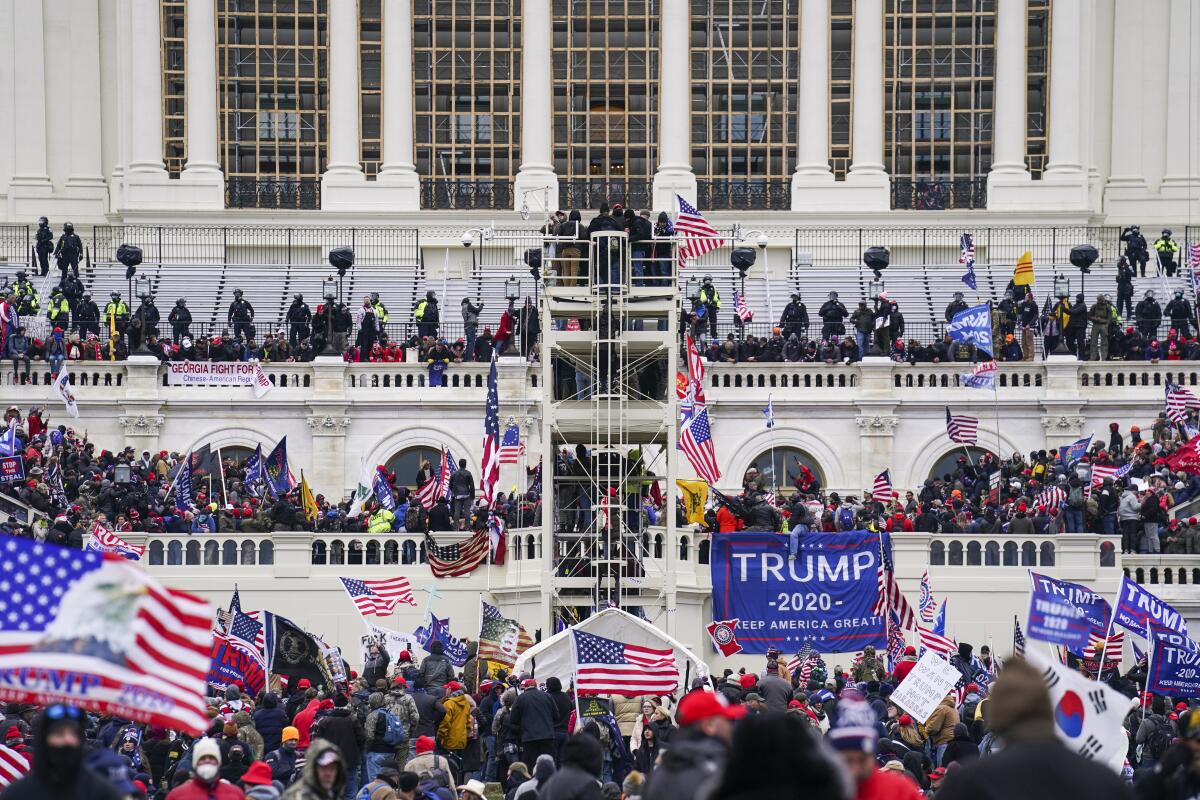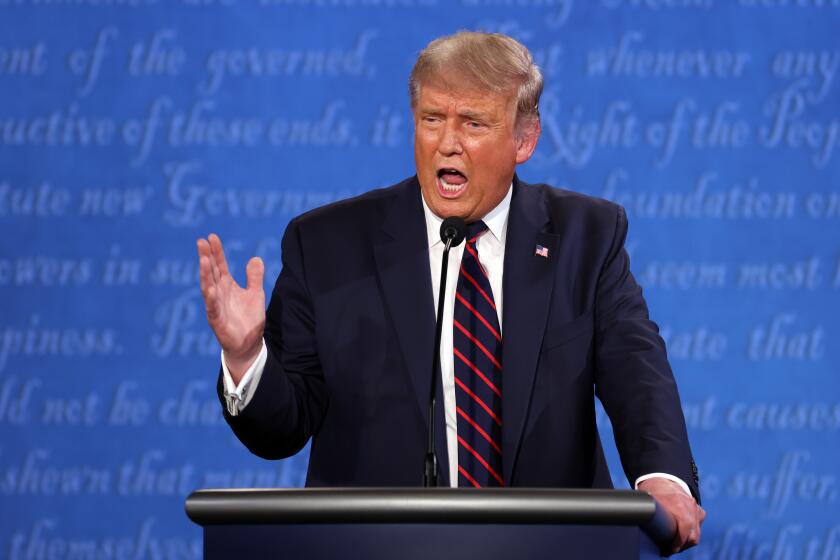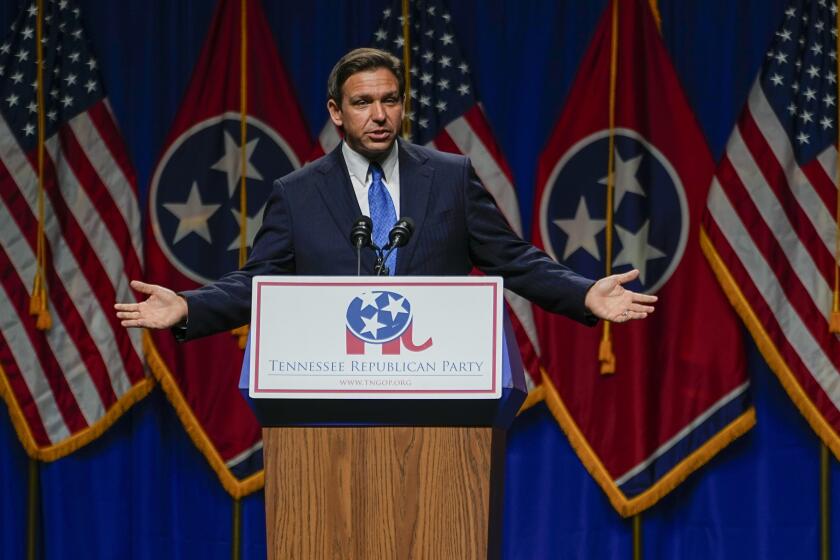If Trump is indicted for Jan. 6, there’s more than enough evidence to convict him

- Share via
Donald Trump announced this week that he has been notified that he is a target of special counsel Jack Smith’s investigation of the events of Jan. 6, 2021. That suggests he is likely to be indicted in the coming days for his role in the first insurrection on American soil since the Civil War. Originated and directed by the then-president, the attempt to prevent the peaceful transfer of power was the culmination of a series of attacks on our democracy by him and his allies, employing increasingly desperate methods to undermine our election and institutions of government.
Smith’s central investigation concerns Trump’s suspected crimes against the Constitution and the nation. Even with other charges pending against Trump in New York and in Smith’s classified documents case, this prosecution will force him to face judgment for his worst offenses: those against our democracy itself.
While we should not minimize the severity of the other crimes with which Trump has been and perhaps will be charged, this conduct is different in that it’s intimately and inextricably linked to his occupancy of our highest office. This would be an indictment for crimes he allegedly committed as president against we, the people.
The ‘Gish gallop’ is the rhetorical equivalent of music’s wall of sound — it drowns out facts and reason. Donald Trump and RFK Jr. excel at it.
Everything we have seen from the special counsel leads us to believe that he understands the severity of these acts and will bring an indictment that is both efficient and equal to their magnitude. As we outlined in a model prosecution memo we developed with a bipartisan group of experts, we expect the charges to be focused and serious.
Like Smith’s classified documents charges, which include one alleged Trump co-conspirator, a Jan. 6 indictment could involve a few people referred to the Justice Department by the House committee that investigated the assault on the Capitol. In addition to Trump, we think it’s possible that there will be charges against two attorneys referred to the department, John Eastman and Kenneth Chesebro.
While the committee also referred another Trump lawyer, Rudy Giuliani, and former White House Chief of Staff Mark Meadows to the Justice Department, it is not clear that either will be charged soon. Though Smith may follow up the expected indictment with separate charges against others, he is likely to keep the indictment of the former president streamlined. Indeed, it could deal with Trump alone while referring to one or more unindicted co-conspirators.
We also expect Smith to charge only the central crimes that Trump and his allies are suspected of committing over the course of a months-long scheme to overturn our democracy. It would not be surprising to see charges related to the schemes to submit fraudulent electoral votes to Congress, which could be alleged as a conspiracy to defraud the United States in the administration of elections. The preparation and submission of these fake slates of electors was a key step in the plan to overturn the election.
The fake electors plot was also clearly illegal and is relatively straightforward to prove. We have already seen how seriously it’s being taken in other jurisdictions: On Tuesday, Michigan’s attorney general charged 16 “false electors” with submitting forged certificates for Trump. Smith will not have missed this crucial element of the scheme.
Trump’s Republican challengers have depressing fundraising and polling numbers. History shows it’s too early to rule anyone out, but there’s never been a primary like this one.
When it became clear that Congress would not accept these “alternate” electors, Trump and his co-conspirators attempted to use them to stall and ultimately obstruct the constitutionally mandated congressional certification of the election on Jan. 6. We expect the special counsel to bring charges for that too, perhaps as unlawful obstruction of an official proceeding. At that point, Trump’s primary goal was not to get the slates accepted but rather to clear the way for Vice President Mike Pence to delay or prevent Congress’ certification of Joe Biden’s election.
When that also failed, Trump’s final ploy to overturn the 2020 election was to trigger a violent insurrection to physically force Congress to abandon the counting of electoral votes and delay the transfer of power for the first time in American history. While we don’t expect Smith to overlook the importance of the attack on the Capitol, we are less certain that he will bring charges specific to the riot rather than the broader course of conduct.
Trump’s encouragement of the assault could be charged as inciting an insurrection and giving aid or comfort to insurrectionists. But his conduct also constituted a conspiracy against members of Congress, the vice president and indeed every voter who cast a ballot for Biden. So it could also be charged under the federal statutes that prohibit conduct that undermines the privileges or rights guaranteed by the Constitution or laws of the United States.
While Trump, like all defendants, is legally entitled to be presumed innocent until proven guilty, we believe the special counsel has more than enough evidence to win convictions on such charges. This is especially true if, as we expect, he focuses on the central alleged crimes that we mentioned above and detailed in our memo.
This would not be a partisan indictment despite Trump’s efforts to portray it as such. It is a result of thousands of hours of work by dedicated career investigators and prosecutors. Ultimately, we are here solely because of Trump’s own transgressions.
The former president conspired to overturn the 2020 election. He tried to advance slates of fraudulent electors; then he attempted to bully his vice president into unilaterally overturning the election; and when all that failed, he riled up a crowd of armed supporters and sicced them on Congress.
Trump repeatedly attacked our democratic institutions and our right to choose our leaders. If he faces criminal charges for doing so, he has no one to blame but himself.
Noah Bookbinder is the president of Citizens for Responsibility and Ethics in Washington (CREW). Norm Eisen is a senior fellow in governance studies at the Brookings Institution.
More to Read
A cure for the common opinion
Get thought-provoking perspectives with our weekly newsletter.
You may occasionally receive promotional content from the Los Angeles Times.











